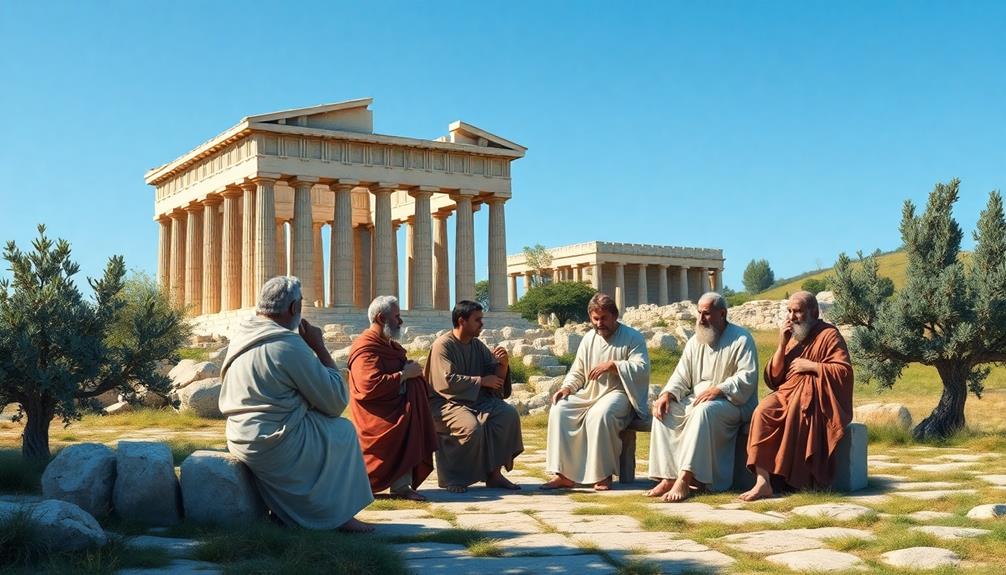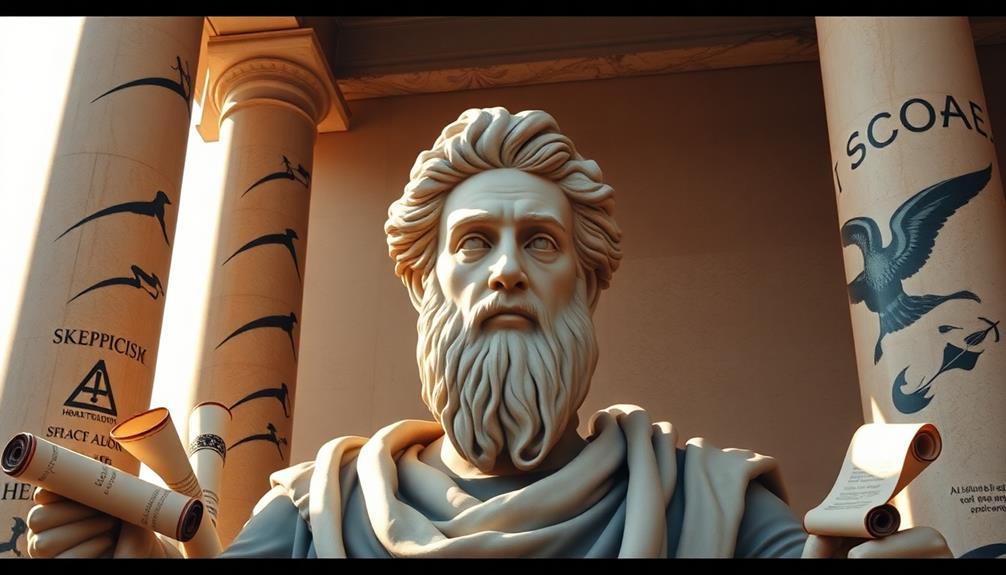Skepticism plays an essential role in understanding Ancient Greece. It encourages you to critically evaluate beliefs, challenging dogmas of the time. Key figures like Arcesilaus and Pyrrho pushed for a suspension of judgment, which led to deeper inquiries into ethics and knowledge. By questioning established truths, skepticism shaped philosophical thought and influenced modern critical methods. It's not just about uncertainty; it promotes mental tranquility while encouraging sound decision-making. If you want to grasp how this philosophical movement greatly impacts our understanding of knowledge, there's much more to explore beyond these foundational insights.
Key Takeaways
- Skepticism promotes critical inquiry, encouraging examination of beliefs central to Ancient Greek philosophy and thought.
- The conflict between skepticism and dogmatism, especially with Stoicism, highlights significant philosophical debates in Ancient Greece.
- Key figures like Pyrrho and Sextus Empiricus influenced the development of epistemology and ethics through their skeptical approaches.
- The practice of suspension of judgment fosters a culture of questioning, crucial for understanding Ancient Greek intellectual traditions.
- Skepticism laid the groundwork for modern scientific methods, illustrating its enduring impact on philosophical discourse.
Overview of Ancient Greek Skepticism

Ancient Greek skepticism offers a compelling framework for examining beliefs and questioning the nature of knowledge. Rooted in the Greek term "skepsis," meaning inquiry, this philosophical movement encourages you to critically analyze your understanding of truth.
The two primary branches of ancient skepticism are Academic skepticism and Pyrrhonian skepticism. Academic skepticism, led by figures like Arcesilaus and Carneades, contends that certain knowledge is unattainable, while Pyrrhonian skepticism, represented by Pyrrho and later Sextus Empiricus, emphasizes a more radical suspension of judgment, or epochē.
Academic Skepticism and Key Figures

In exploring Academic Skepticism, you'll encounter key figures like Arcesilaus and Carneades, who reshaped philosophical thought in the Academy.
Arcesilaus challenged the idea of certainty, while Carneades introduced practical criteria for evaluating beliefs, highlighting the tension between skepticism and Stoicism.
Together, they sparked critical discussions that influenced later philosophical debates.
Arcesilaus' Philosophical Influence
A notable shift in philosophical thought emerged with Arcesilaus of Pitane, whose contributions laid the groundwork for Academic Skepticism. He championed the suspension of judgment, challenging the very notion of knowledge and even the claims of knowing anything at all.
By reviving Socratic dialectical practices, Arcesilaus encouraged rigorous examination of opposing viewpoints, fostering a culture of debate that critiqued Stoicism's dogmatic assertions.
Arcesilaus specifically targeted Stoicism's concept of kataleptic impressions, questioning the reliability of sensory experiences. Through compelling examples, such as twins and wax imprints, he illustrated the inadequacies of these impressions, prompting deeper skepticism. This approach not only highlighted the limitations of human knowledge but also underscored the importance of inquiry over certainty.
As a result, Arcesilaus notably influenced the development of Academic skeptics, paving the way for his successor, Carneades. Carneades further expanded on Arcesilaus' ideas, advocating for a flexible evaluation of beliefs.
Together, they marked a pivotal moment in philosophical discourse, shifting the Academy's focus toward a more skeptical, questioning mindset that remains relevant in philosophical discussions today.
Carneades' Ethical Contributions
Carneades of Cyrene stands out as a pivotal figure in Academic Skepticism, greatly shaping the discourse on ethics. His contributions highlight the complexities of ethical knowledge, as he expanded on the skeptical arguments of his predecessor, Arcesilaus.
During his notable visit to Rome, Carneades argued both for and against the concept of justice, illustrating the uncertainties that surround ethical principles.
Challenging Stoic perspectives, especially Chrysippus' views on kataleptic impressions, he questioned whether true wisdom and knowledge were attainable. Carneades introduced the idea of the summum bonum, raising doubts about the existence of a knowable ultimate good. This skepticism emphasized that ethical knowledge might be more elusive than previously thought.
His legacy also includes the development of the practical criterion known as to pithanon, which allowed for a more flexible approach to evaluating beliefs. This concept underscored the provisional nature of knowledge, reminding us that certainty in ethics is often unattainable.
Through Carneades' dialectical methods and thought-provoking arguments, you can see how Academic Skepticism fosters a deeper understanding of ethical dilemmas and challenges the certainties that many take for granted.
Stoicism and Skepticism Conflict
The clash between Stoicism and Academic Skepticism reveals profound philosophical tensions over the nature of knowledge and ethics. Initiated by Arcesilaus in the 3rd century BCE, Academic skepticism challenged Stoic doctrines by asserting that knowledge couldn't be attained with certainty.
Arcesilaus employed Socratic methods to critique Stoic claims, particularly targeting their idea of kataleptic impressions as reliable sources of knowledge. He questioned the validity of sense perception as a means to discern truth.
Carneades, a key figure who followed Arcesilaus, expanded on these ideas by introducing the practical criterion of to pithanon. This concept allowed you to evaluate beliefs based on plausibility rather than seeking absolute certainty, highlighting a stark contrast to Stoicism's assertion of definite knowledge.
The conflict centered around the Stoics' confidence in their epistemological framework and the skeptics' insistence on the impossibility of distinguishing true from false knowledge.
Cicero's writings, especially in "Academica," offer critical insights into this debate, showcasing the tensions that arise when defining knowledge and considering its implications for ethical behavior. This philosophical struggle remains significant in understanding the complexities of ancient thought.
Pyrrhonian Skepticism Explained

Pyrrhonian skepticism invites you to question the certainty of your knowledge and the reliability of your perceptions. Founded by Pyrrho of Elis in the 4th century BCE, this philosophical approach emphasizes the suspension of judgment, or epoch, as a means to navigate the complexities of human experience.
You'll find that Pyrrhonian skepticism, revitalized by Aenesidemus, introduces ten tropes aimed at generating doubt about the certainty of knowledge and exposing contradictions in perception.
Sextus Empiricus, a key figure in this tradition, compiled extensive writings, especially "Outlines of Pyrrhonism," which systematically challenge dogmatic beliefs. At the heart of Pyrrhonian skepticism lies the pursuit of ataraxia, a state of mental tranquility achieved by suspending judgment.
By doing so, you can live undogmatically, guided by appearances and customs rather than rigid convictions. This approach effectively argues that the infinite regress of criteria for truth makes it impossible to establish absolute knowledge.
Embracing Pyrrhonian skepticism, you learn to navigate life by accepting plausible appearances, fostering a sense of peace amidst the uncertainties of existence.
Skepticism's Impact on Philosophy

Skepticism has profoundly shaped philosophical thought throughout history, encouraging critical examination of beliefs and knowledge claims. Ancient skepticism, particularly through figures like Pyrrho of Elis, emphasized suspending judgment (epoch) and continuous inquiry (skepsis). This approach challenged dogmatic beliefs, prompting philosophical skeptics to question the very foundations of knowledge in general.
Through Aenesidemus' ten tropes, skepticism includes arguments that expose contradictions in sense perception and reasoning, fostering a more nuanced understanding of truth. Academic skepticism, led by Arcesilaus and Carneades, critiqued Stoic and Epicurean doctrines, asserting that the distinction between true and false is often elusive. They advocated for probable standards in ethical and epistemological discussions, further enriching philosophical discourse.
The works of Sextus Empiricus, especially "Outlines of Pyrrhonism," are essential for grasping skepticism's evolution. They emphasize the relativity of perception and the pursuit of mental tranquility, illustrating how skepticism has laid the groundwork for modern scientific methods.
Historical Context of Skepticism

Emerging during the 5th century BCE, skepticism took root in ancient Greece as thinkers grappled with a rapidly expanding landscape of philosophical ideas. This period experienced significant intellectual growth, prompting a critical examination of beliefs.
Pyrrho of Elis, regarded as the founder of skepticism, argued for the suspension of judgment, or epoch, due to the unreliability of human senses and knowledge claims. His ideas directly challenged the dogmatic assertions of schools like Stoicism and Epicureanism, showing the necessity of questioning established truths.
In the 1st century BCE, Aenesidemus revitalized skepticism by introducing ten tropes designed to generate doubt and highlight contradictions in sense perception and reasoning. This approach exemplified the essence of epistemology, urging individuals to scrutinize the foundations of their beliefs.
The development of skepticism laid the groundwork for later philosophical traditions, emphasizing inquiry over dogmatism and shaping both ancient and modern thought. By advocating for a method of philosophical inquiry that prioritized doubt, skeptics encouraged a culture of continuous questioning, pushing the boundaries of understanding in Ancient Greece and beyond.
Challenges to Skepticism

As you explore the challenges to skepticism, you'll encounter self-refutation issues that question its own claims about knowledge.
You'll also see practical implications, like how skepticism can hinder decision-making in everyday life.
Self-Refutation Issues
The self-refutation challenges that skepticism faces raise significant questions about its validity. Critics argue that by claiming knowledge of the impossibility of knowledge, skeptics contradict themselves, as they're asserting a form of knowledge.
David Hume pointed out that our natural instincts and experiences often undermine skeptical principles, suggesting skepticism is practically untenable. Additionally, the Apraxia Charge highlights that skepticism can't operate without some beliefs; after all, action requires judgment, making complete suspension of judgment impractical.
Furthermore, skeptics may find themselves in cognitive paralysis, unable to function or communicate effectively without any guiding beliefs. Ancient skeptics like Sextus Empiricus acknowledged these self-refutation issues, asserting that while skepticism may seem contradictory, it offers practical benefits.
They argued that suspending judgment leads to a tranquil state of mind, freeing individuals from the burdens of dogmatic beliefs. This ability to navigate life without rigid convictions can be seen as a valuable approach, despite the inherent contradictions.
Ultimately, the self-refutation issues challenge you to reconsider the balance between skepticism and the necessity of some beliefs to guide your actions in the world.
Practical Implications of Skepticism
Skepticism's challenge to the certainty of knowledge has real-world implications that affect how you approach everyday decisions. By promoting the suspension of judgment, ancient skeptics like Arcesilaus and Carneades allowed you to navigate life without clinging to absolute truths. This approach can lead to ataraxia, or mental tranquility, helping you manage knowledge claims more effectively.
However, skepticism isn't without its challenges. Critics argue that if you suspend all beliefs, you might face apraxia—the inability to act decisively. Balancing skepticism with practical engagement is essential. Here's a quick overview of how skepticism can influence your decision-making process:
| Aspect | Skepticism Approach | Practical Implications |
|---|---|---|
| Knowledge Claims | Doubtful of absolute truths | Evaluate claims critically |
| Decision-Making | Use of plausible appearances | Act on what seems likely |
| Mental Peace | Aim for ataraxia | Reduce anxiety from certainty |
| Actionability | Risk of apraxia | Need for some belief to act |
| Evaluation Criterion | pithanon (flexible criteria) | Adapt beliefs as new info arises |
Incorporating these ideas can enhance your understanding of how skepticism shapes your daily life.
Conflicting Philosophical Views
Throughout ancient philosophical discourse, skepticism faced significant challenges from dogmatic schools like Stoicism and Epicureanism, which confidently claimed the existence of certain knowledge and objective truths.
These conflicting views positioned skepticism as a target, arguing that its principles could lead to paralysis. Critics contended that by advocating for the suspension of judgement on all matters, skeptics risked rendering individuals incapable of making decisions or taking action.
Philosophers like David Hume asserted that human nature inherently drives you to act on beliefs, even amidst doubts. This notion highlights a fundamental tension: while skepticism questions the reliability of perception, it also suggests a reliance on plausible appearances for practical engagement in daily life.
Skeptics, such as Sextus Empiricus, countered these objections by emphasizing that one could still navigate the world without firm beliefs, relying instead on what seems reasonable.
Ultimately, the interplay between skepticism and other ancient Greek philosophical schools illustrates the rich complexity of thought during that era.
These conflicting views prompted deeper inquiries into the nature of knowledge, truth, and the reliability of your perceptions, shaping the philosophical landscape of ancient Greece.
Legacy of Skepticism in Thought

How has ancient skepticism shaped our modern understanding of knowledge? The legacy of skepticism is profound, influencing how you approach philosophical inquiry today. Figures like Arcesilaus and Carneades emphasized critical analysis and the suspension of judgment, which helps you question the reliability of your beliefs.
| Aspect | Ancient Skepticism | Modern Implications |
|---|---|---|
| Key Figures | Pyrrho, Sextus Empiricus | Arcesilaus, Carneades |
| Core Concept | Suspension of judgment (epoch) | Critical thinking |
| Impact on Philosophy | Challenged dogmatism | Shapes epistemology and ethics |
This ancient philosophy fosters an environment where you can engage in debate, examine assumptions, and pursue mental tranquility (ataraxia). The ten tropes of Aenesidemus still resonate today, highlighting the inherent contradictions in perception and knowledge. Ultimately, skepticism's influence on ethics, truth, and the nature of knowledge encourages you to remain open-minded, fostering a culture of inquiry that remains essential in our quest for understanding.
Frequently Asked Questions
What Is Skepticism in Ancient Greece?
Skepticism in Ancient Greece encourages you to question beliefs rather than accept them blindly. It emphasizes doubt, especially about sensory perceptions, helping you seek mental tranquility by suspending judgment and critically examining knowledge claims.
Why Is Skepticism Important in World History?
Skepticism's essential in world history because it encourages questioning assumptions, fosters critical thinking, and challenges dogma. By promoting inquiry, it shaped philosophical discourse and laid foundations for scientific methods still relevant today.
What Is the Main Point of Skepticism?
Imagine questioning everything you believe. Skepticism's main point is to encourage you to critically assess your beliefs, fostering a mindset that values inquiry over acceptance, ultimately leading to deeper understanding and personal growth.
What Is Skepticism as a Source of Knowledge?
Skepticism serves as a source of knowledge by encouraging you to question assumptions and beliefs. It prompts critical examination, allowing you to navigate uncertainty and discover deeper truths through ongoing inquiry and thoughtful reflection.
Conclusion
In exploring Ancient Greek skepticism, you might find that its principles mirror today's quest for truth. Just as the skeptics questioned certainty, you too can challenge assumptions in your own life. This coincidence reveals a timeless dialogue between past and present, urging you to embrace doubt as a tool for deeper understanding. So, as you navigate your own beliefs, remember: skepticism isn't just an ancient concept; it's a living philosophy that shapes your perspective today.









